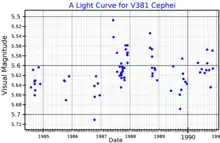 | |
| Observation data Epoch J2000.0 Equinox J2000.0 | |
|---|---|
| Constellation | Cepheus |
| Right ascension | 21h 19m 15.682s[1] |
| Declination | +58° 37′ 24.550″[1] |
| Apparent magnitude (V) | 5.51 - 5.71[2] |
| Characteristics | |
| Spectral type | M1epIb + B[3] |
| U−B color index | 0.00[4] |
| B−V color index | +1.34[4] |
| Variable type | Lc[2] |
| Astrometry | |
| Radial velocity (Rv) | −14.10[5] km/s |
| Proper motion (μ) | RA: −1.435[6] mas/yr Dec.: −5.427[6] mas/yr |
| Parallax (π) | 1.59 ± 0.23 mas[6] |
| Distance | approx. 2,100 ly (approx. 630 pc) |
| Absolute magnitude (MV) | −5.2[7] |
| Details | |
| Aa | |
| Mass | 7.2[8] - 16[9] M☉ |
| Radius | 276[1] R☉ |
| Luminosity | 12,940 - 13,550[1] L☉ |
| Temperature | 3,745±170[1] K |
| Ab | |
| Mass | 13[9] M☉ |
| B | |
| Mass | 7.1[10] M☉ |
| Radius | 3.4[11] R☉ |
| Luminosity | 1,487[11] L☉ |
| Surface gravity (log g) | 4.18[11] cgs |
| Temperature | 19,965[11] K |
| Metallicity [Fe/H] | −0.30[10] dex |
| Rotational velocity (v sin i) | 42.8[12] km/s |
| Age | 49.1[8] Myr |
| Other designations | |
| A: HD 203338 | |
| B: HD 203339 | |
| Database references | |
| A | |
| B | |
V381 Cephei (HR 8164) is a triple star system in the northern constellation of Cepheus. Its apparent magnitude is slightly variable between 5.5 and 5.7.
System
V381 Cephei is a visual double star with components A and B separated by 4.6". The primary is HD 203338 and the secondary is the magnitude 9.2 HD 203339.[9]
HD 203338 is itself a spectroscopic binary with components Aa and Ab orbiting every 280 years.[9] It forms a VV Cephei-type binary system with a hot companion which is accreting mass from the primary. The long period means that it exhibits fewer peculiarities than other VV Cephei binaries.[13]
Properties

Component Aa is a red supergiant and its close companion is a B2 main sequence star. The supergiant is a pulsating variable with a small amplitude and poorly defined period. It is generally given spectral class qualifiers indicating peculiarities and emission, which may be associated with the disc around the hot secondary.[13]
Component B, HD 203339, is a B3 main sequence star with a mass around 11 M☉.[9]
References
- 1 2 3 4 5 Messineo, M.; Brown, A. G. A. (2019). "A Catalog of Known Galactic K-M Stars of Class I Candidate Red Supergiants in Gaia DR2". The Astronomical Journal. 158 (1): 20. arXiv:1905.03744. Bibcode:2019AJ....158...20M. doi:10.3847/1538-3881/ab1cbd. S2CID 148571616.
- 1 2 Samus, N. N.; Durlevich, O. V.; et al. (2009). "VizieR Online Data Catalog: General Catalogue of Variable Stars (Samus+ 2007-2013)". VizieR On-line Data Catalog: B/GCVS. Originally Published in: 2009yCat....102025S. 1. Bibcode:2009yCat....102025S.
- ↑ Josselin, E.; Plez, B. (2007). "Atmospheric dynamics and the mass loss process in red supergiant stars". Astronomy and Astrophysics. 469 (2): 671. arXiv:0705.0266. Bibcode:2007A&A...469..671J. doi:10.1051/0004-6361:20066353. S2CID 17789027.
- 1 2 Ducati, J. R. (2002). "VizieR Online Data Catalog: Catalogue of Stellar Photometry in Johnson's 11-color system". CDS/ADC Collection of Electronic Catalogues. 2237. Bibcode:2002yCat.2237....0D.
- ↑ Gontcharov, G. A. (2006). "Pulkovo Compilation of Radial Velocities for 35 495 Hipparcos stars in a common system". Astronomy Letters. 32 (11): 759–771. arXiv:1606.08053. Bibcode:2006AstL...32..759G. doi:10.1134/S1063773706110065. S2CID 119231169.
- 1 2 3 Brown, A. G. A.; et al. (Gaia collaboration) (August 2018). "Gaia Data Release 2: Summary of the contents and survey properties". Astronomy & Astrophysics. 616. A1. arXiv:1804.09365. Bibcode:2018A&A...616A...1G. doi:10.1051/0004-6361/201833051. Gaia DR2 record for this source at VizieR.
- ↑ Stothers, R.; Leung, K. C. (1971). "Luminosities, masses and periodicities of massive red supergiants". Astronomy and Astrophysics. 10: 290. Bibcode:1971A&A....10..290S.
- 1 2 Tetzlaff, N.; Neuhäuser, R.; Hohle, M. M. (2011). "A catalogue of young runaway Hipparcos stars within 3 kpc from the Sun". Monthly Notices of the Royal Astronomical Society. 410 (1): 190–200. arXiv:1007.4883. Bibcode:2011MNRAS.410..190T. doi:10.1111/j.1365-2966.2010.17434.x. S2CID 118629873.
- 1 2 3 4 5 Tokovinin, A. A. (1997). "MSC - a catalogue of physical multiple stars". Astronomy and Astrophysics Supplement Series. 124: 75–84. Bibcode:1997A&AS..124...75T. doi:10.1051/aas:1997181.
- 1 2 Anders, F.; Khalatyan, A.; Queiroz, A. B. A.; Chiappini, C.; Ardevol, J.; Casamiquela, L.; Figueras, F.; Jimenez-Arranz, O.; Jordi, C.; Monguio, M.; Romero-Gomez, M.; Altamirano, D.; Antoja, T.; Assaad, R.; Cantat-Gaudin, T.; Castro-Ginard, A.; Enke, H.; Girardi, L.; Guiglion, G.; Khan, S.; Luri, X.; Miglio, A.; Minchev, I.; Ramos, P.; Santiago, B. X.; Steinmetz, M. (2022). "VizieR Online Data Catalog: StarHorse2, Gaia EDR3 photo-astrometric distances (Anders+, 2022)". Vizier Online Data Catalog. Bibcode:2022yCat.1354....0A.
- 1 2 3 4 Vallenari, A.; et al. (Gaia collaboration) (2023). "Gaia Data Release 3. Summary of the content and survey properties". Astronomy and Astrophysics. 674: A1. arXiv:2208.00211. Bibcode:2023A&A...674A...1G. doi:10.1051/0004-6361/202243940. S2CID 244398875. Gaia DR3 record for this source at VizieR.
- ↑ Glebocki, R.; Gnacinski, P. (2005). "VizieR Online Data Catalog: Catalog of Stellar Rotational Velocities (Glebocki+ 2005)". VizieR On-line Data Catalog: III/244. Originally Published in: 2005csss...13..571G; 2005yCat.3244....0G. 3244. Bibcode:2005yCat.3244....0G.
- 1 2 Halbedel, Elaine M. (1991). "Photometric variability for the VV Cephei-like star HR 8164". Astronomical Society of the Pacific. 103: 310. Bibcode:1991PASP..103..310H. doi:10.1086/132820. S2CID 120879494.
- ↑ Halbedel, Elaine M. (March 1991). "Photometric Variability for the VV Cephei-Like Star HR 8164". Publications of the Astronomical Society of the Pacific. 103: 310. Bibcode:1991PASP..103..310H. doi:10.1086/132820. S2CID 120879494.